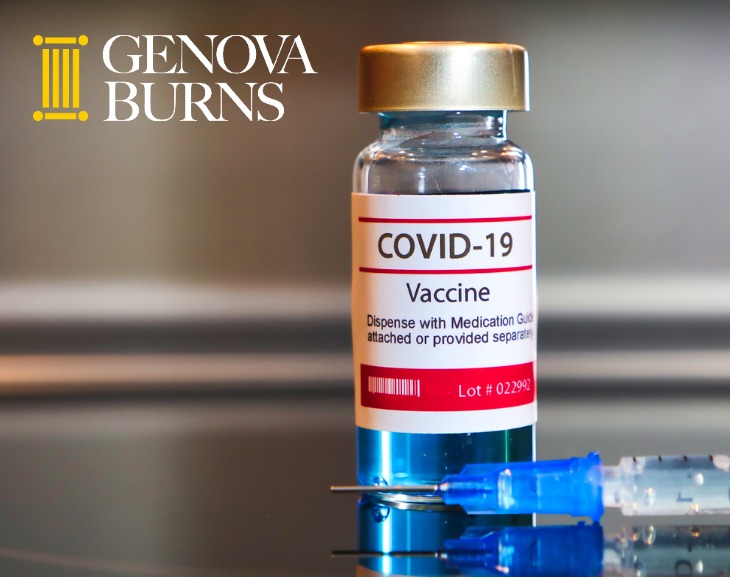Requiring the COVID-19 Vaccination at Work: Issues for NJ Employers to Consider When Developing a COVID-19 Vaccination Program
November 24, 2020 | By: Brigette N. Eagan, Esq.
We have seen recent articles speculating on whether employers can require their employees to take an FDA-approved COVID-19 vaccination as a condition of employment or continued employment. Here, without giving any legal advice, for private (non-governmental) New Jersey employers, odds are that this type of employment rule will be permissible, with certain limitations, discussed below. Predicting the permissibility of a COVID-19 vaccination program is an easier question for New Jersey employers to answer. This is because, this year, the State of New Jersey required employers that are hospitals, nursing homes, and home health care agencies to adopt plans mandating that their employees take the influenza vaccine. The requirement applies to those employees with direct patient contact as well as “back-room” and administrative employees. If the State of New Jersey now requires certain employers to implement mandatory influenza vaccination programs (even for employees with no involvement in patient care), it is not a far reach that, given the physical, mental, and financial loss caused by COVID-19, our legislature and courts will find mandatory COVID-19 programs permissible, as long as those programs comply with other federal and state employment laws.
Exemptions To Mandatory Vaccinations
The New Jersey influenza vaccination law contains a medical exemption. Specifically, employees can request an exemption from the influenza vaccination requirement if they can show a medical contra-indication to the vaccination (this means generally that employees can be excused from the vaccination requirement dependent upon some serious medical consequence to taking the vaccine). The New Jersey vaccination law, however, does not contain an express exemption for employees who object to the vaccine based upon their religious beliefs. It has not been tested yet, as to whether our New Jersey courts will read an obligation into the law for employers to accommodate employees’ religious objections to the influenza vaccination.
Where does the New Jersey influenza vaccination law leave us in terms of predicting the permissibility of employer-required COVID-19 programs? We are entering new ground when we think about employers requiring vaccinations as a condition of employment. We have also entered a new world, where fatalities exceed 250,000 individuals in the Unites States, and where unvaccinated employees can be seen as a direct threat to their co-worker’s safety. Drastic times, drastic measures.
Employers considering COVID-19 vaccination programs should still tread lightly. Again, without providing any legal advice, consider including exemptions for medical issues and religious beliefs, in order to defend against challenges to applicable employment laws, such as the New Jersey Law Against Discrimination (which covers religious and medical issues), Title VII of the Civil Rights Act (for religious beliefs), and the Americans With Disabilities Act (for medical issues). As to employees who fall within these exemptions, what accommodations will you, the employer, consider? The glaring accommodation is to allow the employee to work remotely, if the job allows it. If no accommodations are possible, will your policy include unpaid leave or will termination be the only option?
Employees Who Object To Mandatory Vaccinations And Employee Education
There are many other issues employers must plan for when implementing COVID-19 vaccination programs. Employees may claim that they do not trust the vaccine; they worry that they may become ill from it. Or, they may claim the vaccine is simply a political issue, and their objections to the vaccine amount to job-protected whistle-blowing. Others will say that a mandated vaccine violates rights to freedom over their body and speech. How will these employees be treated? In order to defend against some of these types of claims, employers may opt to roll out training simultaneously with their COVID-19 vaccination program (similar to common anti-discrimination training used to educate employees). Or, will your policy be a little more aggressive, and provide that the COVID-19 vaccination is an essential job requirement and failure to comply will result in immediate termination?
Other Practical Considerations
Once your policy is in place, how practically, will you roll it out? Will you have an on-site vaccination program, similar to the flu vaccination where a pharmacist or technician administers the vaccine during the work day? Will you pay for the vaccine? Or, before allowing employees to enter the facility, will you require them to be vaccinated off-site? Again, who will pay the cost, especially for those employees without employer-provided insurance?
Bottom Line
As this article demonstrates, there are more questions than answers at this point. There is hope that the vaccine may be available later this year or early next, on a limited basis. Now is the time to start asking these questions, gauging your own comfort level as the employer, and contemplating what your policies will look like and then asking if they comply with the law. This is an area where we must think hard, but at the same time be comprehensive and firm within the confines of the law. Genova Burns is here to help you traverse this road.
For guidance navigating COVID-19 issues at your workplace, please contact Dina M. Mastellone, Esq., Chair of the firm’s Human Resources Counseling & Compliance Practice Group, via email here or 973.533.0777, or Brigette N. Eagan, Esq., Counsel in the firm’s Human Resources Counseling & Compliance Practice Group via email here or 973.533.0777.
Tags: Genova Burns LLC • COVID-19 • Dina M. Mastellone • Brigette N. Eagan • Human Resources Counseling & Compliance • Employment Law & Litigation • Mandatory Vaccination • NJLAD • ADA


